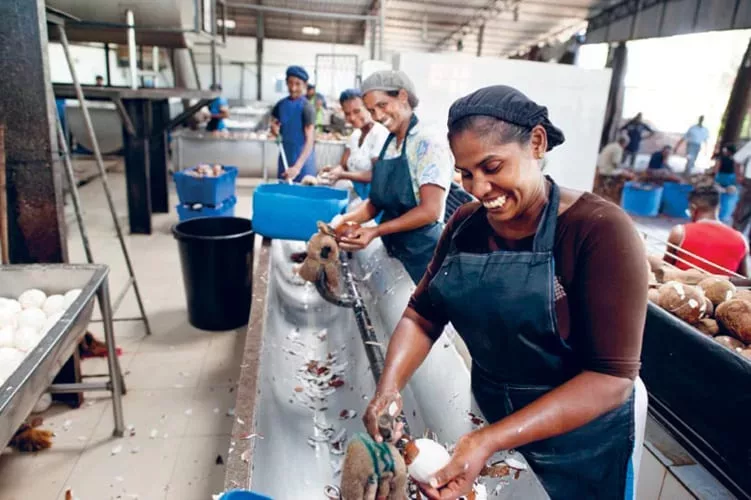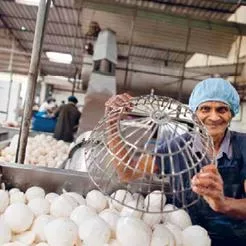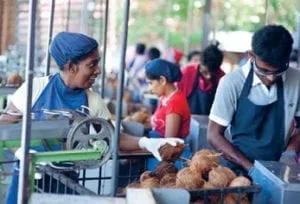
Fair Trade and Dr. Bronner’s
Dr. Bronner, pictured holding a bottle of the company’s most recognizable product—liquid castile soap—with the iconic “ALL-ONE” label. Follow a timeline tracing the history of Dr. Bronner’s at its website, or watch the fascinating 2006 documentary film, Dr. Bronner’s Magic Soapbox, to learn about the compelling family history behind the company.
B-Corps
In the April 2016 Co-op News, we had the opportunity to shine a spotlight on some of the many B Corp-certified businesses we work with, including local B Corps Aslan Brewing Company and Moon Valley Organics.
In May, it is time for fair trade businesses to take their deserved turn in the spotlight. The 2016 celebration of World Fair Trade Day on May 14 will be centered on the theme “Be an Agent for Change.” That might sound familiar, since the B Corp tagline is “B the Change.” Once again proving that great minds think alike!
There is a lot to celebrate about businesses that are dedicated to fair trade practices.
One of our favorite fair trade companies is Dr. Bronner’s, not surprisingly it is also B Corp certified.
Fair trade is a tangible solution to poverty eradication, a good tool for sustainable development, and most of all, fair trade promotes social justice.
Most Co-op shoppers are familiar with Dr. Bronner’s products; from its iconic Castile Liquid Soap—with the even more iconic original blue “ALL-ONE” label—to its newest foray into organic virgin coconut oil.
Dr. Bronner’s shares a lot of interesting insights on its website about its ethical sourcing practices. For instance, the coconuts used in Dr. Bronner’s products are ethically sourced from Sri Lanka and Kenya. And the coconuts specifically used in the food grade virgin coconut oils are sourced from the sustainable Serendipol project in Sri Lanka.
Serendipol originally grew out of a relief project established after 30,000 people in Sri Lanka lost their lives in a 2004 tsunami.
Built, owned, and operated by Dr. Bronner’s, and local partners, Serendipol has become the world’s foremost source of certified fair trade and organic virgin coconut oil.

Dr. Bronner’s factory in Kuliyapitiya supports the livelihoods of more than 750 organic farmers and 275 staff members, and has a major impact on local community development. It pays fair prices to farmers and supports them with organic inputs and organic agriculture training, which improves soil quality, yields, and profitability. Mill workers enjoy working conditions and compensation uncommon in the industry, and in an area that has few reliable jobs to offer to its growing rural population.
The fair trade premium paid by Dr. Bronner’s and other customers for Serendipol coconut oil is used for a range of community development projects, such as setting up a composting operation to support farmers with organic fertilizer at cost, supporting several regional clinics with critical equipment, renovating schools and supporting vocational training, connecting remote villages to the power grid, and renovating bridges.
Serendipol has proven that producing organic virgin coconut oil can be sustainable and fair, while supporting rural development in a significant way. So the next time you purchase a jar of Dr. Bronner’s Organic Virgin Coconut Oil, rest assured that every person along the entire supply line for that product has been fairly compensated for their work.
Learn more about all of Dr. Bronner’s products, ethical sourcing, and the company’s positive impact around the world at drbronner.com.


Photos courtesy Dr. Bronner’s.
An interesting by-product of this process is the production of nigari, also called bittern. Nigari is used as a coagulant in the making of tofu, and the salt farm sells it to people who want to make their own homemade tofu. Who knew?
After careful monitoring to achieve the preferred moisture content, San Juan Island Sea Salt is ground to a consistency similar to fleur de sel. The irregular crystal size, lots of minerality, and a slight moisture content make it ideal as a finishing salt to sprinkle atop your baked goods, meats, vegetables, chocolates and caramels, egg dishes, or pretty much anything that would benefit from a pinch of salt. Of course, you can also use San Juan Island Sea Salt in recipes, just like any common salt.
Due to a combination of the trace minerals in the salt and our wet climate (and steamy kitchens), it’s completely natural if your San Juan Island Sea Salt gets a tiny bit clumpy. When needed, just give the jar a quick whack to loosen and sprinkle on the salty riches of the sea.
About World Fair Trade Day

World Fair Trade Day falls on the second Saturday of May of each year. It is an inclusive worldwide festival of events celebrating Fair Trade as a tangible contribution to the fight against poverty and exploitation, climate change, and the economic crises that have the greatest impact on the world’s most vulnerable populations. Trade must benefit the most vulnerable and deliver sustainable livelihoods by developing opportunities for small and disadvantaged producers. Millions of producers and traders, businesses and policy-makers, supporting organizations and volunteers have contributed to the substantial growth of Fair Trade globally.